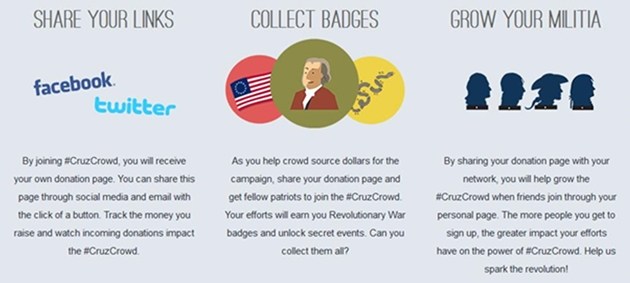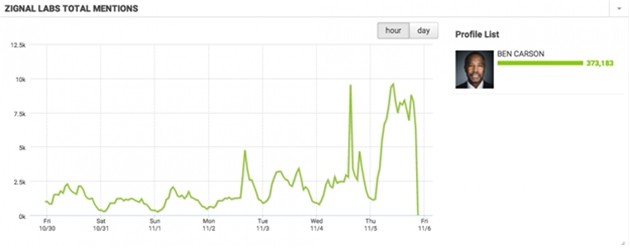The GOP campaign has been continually heating up, and that's good news for marketers. Every day, candidates are experimenting with their digital strategy, and as a recent study from Pew Research finds, digital strategies are becoming more important for presidential candidates.
So let's take a look at top GOP candidates' digital strategies, which tools they're using, and how their wins (or epic fails) might be relevant to your business.
I've rank-ordered six GOP candidates according to their digital marketing strategy.
No. 6: Jeb Bush
By venturing onto platforms like Snapchat and Instagram for the first time, Jeb Bush shows us that it's never too late to try to give your own spin to new tech... Or is it?
Jeb has made some halfhearted efforts to get behind new technology, announcing his candidacy through Snapchat and promoting his PAC (political action committee) on Instagram. Both accounts haven't been factors since, however.
On the campaign trail, Jeb staffers are tightlipped about his digital strategy. Jeb has been running his campaign much like his governorship: nose-to-the-grindstone, get-it-done with no muss and no fuss over the petty details.
As for results generated, Bush's presence on social media has been tepid at best, highlighted by his 363K Twitter followers to date.
But there's more to the story.
Bush's social media strategy seems to "move quietly and stealthily"—gathering funding from industry, insiders, and organizations, only to possibly plow ahead and leave his competitors baffled in the dust. Bush isn't about the hype: he's laser-focused on his day-to-day goals—not flame wars or other distraction. If you look at his Twitter account, for instance, every post maps to a specific aspect of his campaign. Example themes include education, "behind the scenes," and efficiency in government.
Jeb Bush takeaway: Social media, especially on Twitter, isn't the place to be overly sensible and pragmatic.
Jeb's social content centering on core values and themes, although praiseworthy, can be reminiscent of companies' using social media to share corporate mission statements. Instead, opt for content that evokes emotion—make people cry, laugh, or get angry.
Bush's Twitter feed shows us the consequences of a lukewarm persona. His Twitter strategy isn't particularly strong—it's just there. It's not controversial or overly loved.
To determine your ideal persona, look at your specific marketing goals: If you're aiming to become president of the US, for instance, you absolutely want to stick to the core pillars and themes of your campaign, but you'll need a social media persona that connects with your audience, too.
The bottom line? In addition to paying attention to the content that you're sharing on social media, be attentive to the overall impression you're setting.
No. 5: Marco Rubio
Marco Rubio has positioned himself as a "candidate of the people." His strategy? Keep a low profile and don't get embroiled in the debates that are knocking other candidates off course.
But when you're running a digital campaign as a presidential candidate, low profiles are impossible to maintain.
His persona has followed him on to social media: he has clearly positioned himself as a man who identified with his people—and he finds ways to reinforce this subtle messaging in his social media strategy.
Case in point: just take a look at Rubio's Twitter stream. Browse through the first 20 tweets, and you'll see at least 10 retweets featuring comments from his community. It's this approach that has helped grow his following close to 1M people.
Marco Rubio takeaways: Use your community for your social media content. It's easy for marketers to forget this simple yet powerful approach to reaching audiences. Put the megaphone aside, and listen to your audience. It's a subtle gesture with a strong storytelling force behind it.
How do you choose the right community tweets to feature on your own page? In Rubio's case, every retweet does two things: (1) showcases Rubio's community and (2) relates back to his personal brand as a 'candidate of the people.'
The takeaway? When retweeting, focus on your community's story while prioritizing the story about your brand, too.
No. 4: Carly Fiorina
Analysts are keeping a close eye on numbers and words surrounding Fiorina's campaign—from word clouds to social media mentions, she's the longshot that just won't quit.
And here's why: She knows what she wants from social media, and she goes after it.
Despite the looming specter of some 40,000 Hewlett-Packard layoffs and her failed 2010 campaign run, Carly Fiorina does many things right.
The secret behind her successful public image? Her openness and willingness to answer questions with her community—and she's using new social media technology to further these objectives.
For an example, take a look at the Q&As that Fiorina has conducted on Periscope. Yes, her team deals with comment trolls. And, yes, her team needed to sift through volumes of irrelevant questions to get to the good ones. But "Fiorina's priority to actually reply to comments on social media makes her stand out in her own way. Even if it's her team answering questions, it has the appearance of her not being above the 'common people,'" says Tanner Page, who analyzes social platforms at Workcrowd.
Carly Fiorina takeaways: Take the time to answer questions on social media. Fiorina seems to be doing this the best. Few other candidates, if any, actually take the time to respond to comments on their social media feeds.
Use niche, real-time streaming platforms such as Periscope, and answer questions in real time. It's a definite push out of most marketers' comfort zones, but it's a powerful way to communicate that empathetic, human connection.
If a presidential candidate can "put herself out there" on a streaming live chat, a brand marketer can do the same for his or her brand.
No. 3: Ted Cruz
What would you do if, instead of putting your funding in the hands of the Washington elite, you put it in the hands of everyday people?
That vision behind Ted Cruz's innovative digital strategy is what puts him at No. 3 on this list. With his crowdsourcing efforts, he's positioned himself as "the people's candidate."
Through Cruz Crowd, he is relying on the power of the people—not just via Facebook and Twitter, but by crowdfunding and gamification as well. For example, you can recruit friends (called "patriots") to join your personal Cruz Crowd donation page. Then, using Facebook and Twitter, you can monitor money you've raised. And as you continue to participate, you can earn game badges to showcase your efforts:

Gimmicky? Maybe a little, but it seems to be working. He's raised bookoo amounts of cash through his fundraising.
His campaign also promotes the Cruz Crew v app, a competitive game that earns players points based on actions they take in spreading the word about Cruz's campaign. In its first three months, the Cruz Crew app was downloaded over 15,000 times, and more than 2.5 million action points have been awarded to players for sending out invites through the app and taking other actions related to the campaign.
Ted Cruz takeaways: Use crowdsourcing and gamification to promote campaigns within your company or brand. Looking at what's worked for Cruz, you could launch a community ambassador program in which participants can earn points, rewards, or access to exclusive events. Turn your dedicated followers into "advocacy marketers."
Cruz has proven that even stale, boring, traditional political campaigns can be turned into something engaging and interesting. What's more, people love competition, especially for a cause they care about. Services like Badgeville make integrating such a rewards system possible for a variety of businesses.
You already know what your customers care about and want. Now, add a gamification layer to make your website more engaging.
No. 2: Ben Carson
Ben Carson consistently receives high marks for being "honest and trustworthy" in the polls. The reason? It's the thoughtful way that he addresses his 4.6 million Facebook fans.
He crushes it with heartfelt, long-form letters (295,000+ likes? Wow.) on Facebook that speak to middle-class, forty-somethings all over America—the main demographic that seems to share political stuff on Facebook. Moreover, Carson engages in the comments, scoring him more authenticity points.
Whether he's making statements about his past or talking about how the ancient pyramids may have been used to store grain, social media is clamoring over Ben Carson, too.

A chart showing social media mentions of Ben Carson after the pyramid gaffe
Carson's success doesn't stop with the visibility he's building. More importantly, he's inspiring his audiences to take action. In addition to reading and feeling something of value, campaign supporters know exactly what next steps to take.
So how does Caron's team facilitate this process? According to the National Review and Carson campaign manager Barry Bennett, his staff regularly posts petitions and polls as a means of getting new email addresses for their mailing list. "Last week we had a petition on Facebook to stop the Iran deal. Over 300,000 people signed it," Bennett says. "Now I can talk to those people directly about foreign policy, or send them an email and ask, 'Do you want a 'Stop the Iran Deal' T-shirt from Ben Carson?"
Even his more controversial statements have been used to his advantage. Recently, when he commented on NBC's "Meet the Press" that he would not support a Muslim president, the media was quick to grab their pitchforks and torches. Carson took to social media to implore his followers for support, setting a $100,000 funding goal against political correctness. They raised $650,000 that day. Carson also later clarified his comment.
With over 4 million followers (compared with Hillary's 1.5 million and Trump's 3.8 million), Carson is the clear frontrunner on Facebook. Although Donald Trump has had an account there since 2009, Carson's Facebook page dates from September 2014.
Ben Carson takeaways: Use Facebook to write longer, heartfelt messages in your own style. Those were the messages that were shared the most on Carson's Facebook wall. Also, use polls and petitions to collect email addresses. That's a vastly underrated way to gather information from your following. Side with a cause or launch a poll. Then collect those leads.
No. 1: Donald Trump
Love him or hate him, Donald Trump knows exactly what he's doing on social media and other digital outlets. From presenting his tax plan on Periscope to rallying crowds across Facebook and Twitter, Trump—like all savvy businessmen—has a plan.
Media piece after media piece after media piece predicts his downfall and feature his latest comments—all while wondering "how did he do it?"
Trump loves the spotlight, and the social media loudspeaker is great for retorts and roasting comebacks that leave his competitors scrambling and the media howling. Although he has stepped away from the entertainment spotlight, he still can't resist getting a few jabs in over Twitter and drumming up more support among his conservative base.
Jeb, why did your brother attack and destabalize the Middle East by attacking Iraq when there were no weapons of mass destruction? Bad info?
— Donald J. Trump (@realDonaldTrump) October 18, 2015
The Trump and Bush feud ignited campaigns over Twitter
He's not throwing around ad money like other candidates. Instead, with the help of his 29-year-old media coordinator, he gets boy-band attention from media outlets. Earned media, good or bad.
Donald Trump's unfiltered Twitter account reads like it's actually from Trump. Comments that might typically derail a campaign just keep him in the spotlight.
And speaking to the people? Trump is "real" as it gets. He hosted a live Q&A with the hashtag #AskTrump and responded to questions with individual videos, all with his vintage Trump stare-at-camera approach.
There's no magic to what you see online. Online marketing is built by science and smarts—as you can see by the results of Trump's media teams.
Donald Trump takeaways: Use social media to be controversial and troll the media—it's the most cost-effective way to get mainstream media mentions. Obviously, you want to protect your brand with integrity—a line that Trump has crossed a few times—but don't be afraid to side with unpopular beliefs or call out someone. People are starving for more authenticity.




